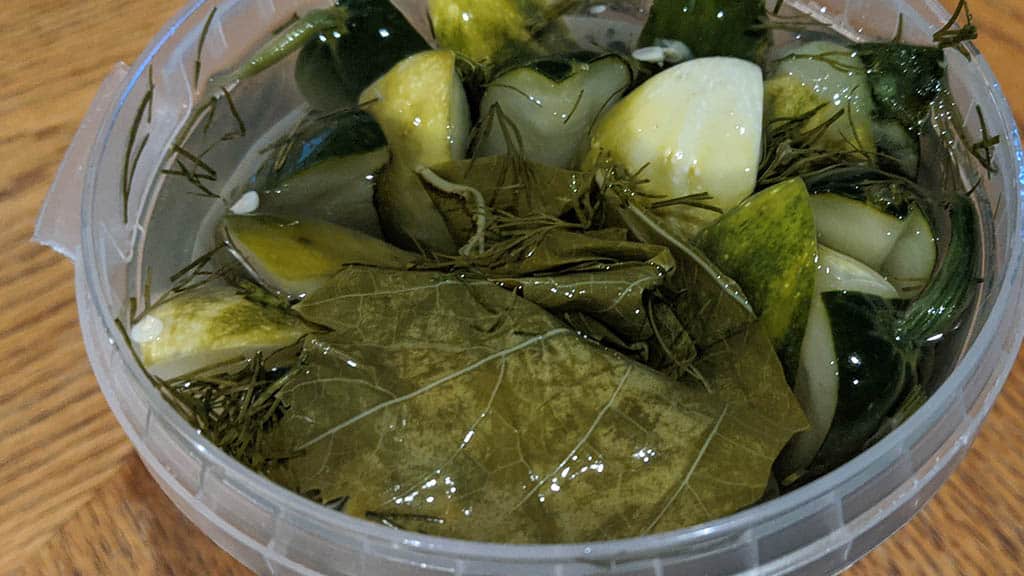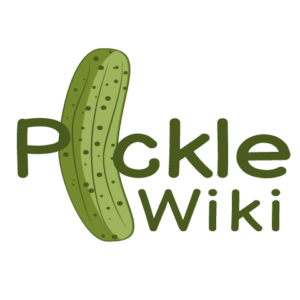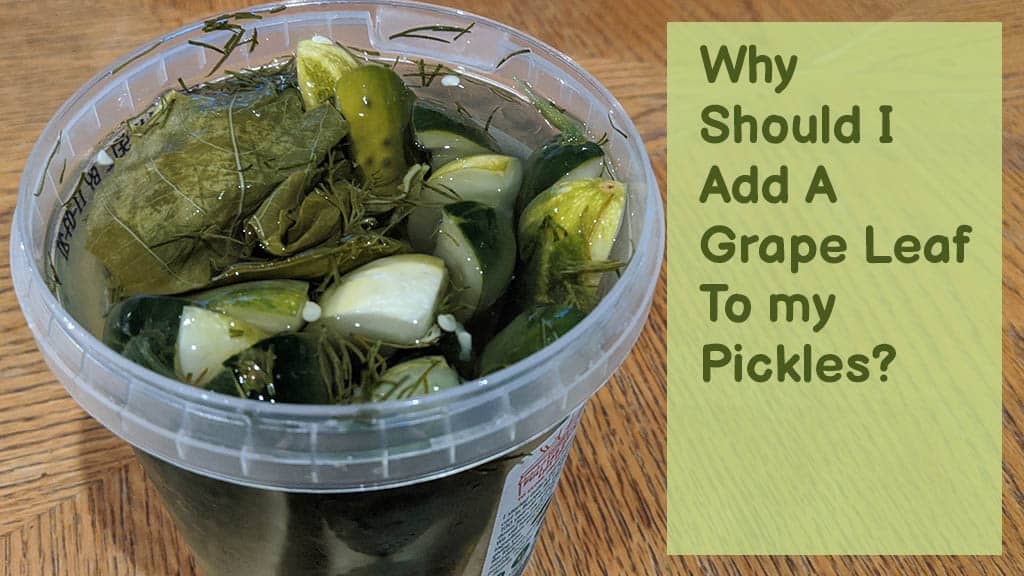There are many reasons you should add grape leaves to your pickles. Grape leaves help to keep your pickles crispy, and they also infuse elements into your pickle juice that are beneficial to your health! The beautiful thing about this age-old method is that you can use it whether you make your own pickles or buy them from the store.
There are several reasons that you should add grape leaves to your pickles:
- Grape leaves are a tannin-rich leaf that aides in the fermentation process.
- The grape leaf will not affect the taste of your pickled cucumbers.
- They have several added health benefits as well.
In this article, we will explain in detail why you should add a grape leaf to your pickles. No one likes biting into a soggy pickle! But aside from the crispiness factor, there are other benefits as well that we’ll explain.
Why Add a Grape Leaf to My Pickles?
Grape leaves are a fantastic addition to your jar of pickles. Whether you purchase them from the store, or you can your own, adding a grape leaf will help keep your pickles from becoming soggy.
The grape leaf releases tannins to inhibit the enzymes that break the skin down. You will find yourself enjoying a fresh, savory pickle with a lovely crunch to it because of the tannins. While tannins tend to be extremely bitter, this method will not change the taste of your pickled cucumbers.
One property that grape leaves contain is tannin, which is key to keeping your cucumbers crispy. Tannin is a complex chemical. It is a large molecule that binds to proteins and cellulose. This action of tannin prevents the cell walls of the cucumber from breaking down. Thus, creating insolubility and resistance to decomposition.
Tannins can have benefits for your health as well:
- They can accelerate blood clotting naturally
- Reduce blood pressure
- Eliminate harmful microbes and viruses from your body.
Grape leaves contain small amounts of tannin; however, tannin can be detrimental to the consumer in large quantities.
Tannin was originally used along-side activated charcoal. When these properties are ingested, they absorb any toxins in the gastrointestinal tract. Companies have discontinued using tannin with activated charcoal when it was discovered that the activated charcoal absorbs the tannin.
Having too much tannin in the system can cause adverse effects that include:
- Stomach irritation
- Vomiting
- Liver damage
- And many more other serious health issues.
Using a grape leaf in pickles will hardly produce enough tannins to change the taste, let alone cause any adverse health reactions.

A Grape Leaf Will Add Many Health Benefits to Your Pickles
Grape leaves are also full of beneficial elements such as:
- Vitamins
- Antioxidants
- Minerals
Grape leaves are also a good filler for you if your diet is geared towards low cholesterol and fat, as the leaves do not contain any of these.
Nutritionally, grape leaves only have three calories per leaf. They do not contain any sodium, making them a good choice if you are trying to minimize this in your diet.
Vitamins and Minerals that are Found in Grape Leaves
Because of the vitamins and minerals in the grape leaf, there are many benefits to your overall health by consuming them. Some studies show they can improve memory loss. One specific study from a Korean university showed there was some aide in Alzheimer’s prevention.
The leaf is rich in calcium and magnesium. Calcium is associated with bone health, while magnesium is associated with muscle health. This gives the leaf it’s anti-inflammatory property. The reduction in inflammation also has the potential to improve liver damage. The leaf releases all of these vitamins and minerals into your pickle juice, which is then absorbed by the pickles.
Antioxidants and Antimicrobials that are Found in Grape Leaves
Grape leaves contain a lot of antioxidants. Antioxidants are substances that can protect and prevent cell damage from free radicals. Grape leaves can help protect your skin from the sun, either sunburn or sun aged skin. The grape leaf’s antimicrobial properties can help support your immune system against e. Coli and salmonella as well.
What Is The Best Way to Store Grape Leaves If You’re Not Ready to Add Them to Your Jar?
Grape leaves will stay edible in the fridge for about five days. Just remember to let them come back to room temperature before using them. If you are not planning on using them in that time frame, then freezing them is recommended. Without washing the leaves, stack them and wrap them well in plastic wrap. Then place them in a heavy-duty freezer bag to prevent freezer burn.
Grape Leaves Will Only be Beneficial if You Properly Ferment Your Cucumbers
While grape leaves are an amazing addition to your jar of pickles, they only work if you do the fermentation process correctly. A grape leaf isn’t a magical element that will make your pickles perfect. The only job a grape leaf has is to keep your pickles crunchy, while adding some nutritional value to your fermented cucumbers.
Tips and Tricks for Fermentation Process
To help make sure you’ve done the fermentation process right, there are several tips and tricks you can follow. This way, your grape leaf will be able to do its job and you’ll have an amazing jar of fermented cucumbers to snack on!
- Do not use a standard cucumber
A standard cucumber is not recommended to go through a pickling fermentation. They are too large and are filled with thicker seeds. Pickling cucumbers are smaller, and you need to make sure you pick them at just the right time. They should be slender and green. If they are over-ripened, they will be yellow and plump. If that is the case, these will be better in your salad.
- Make sure you have time to complete the pickling process.
You will want to make sure you have time to complete the pickling process. Cucumbers should be in the fermentation process within hours of picking off the vine. Once the cucumber is picked, water starts to evaporate, and this will cause your pickles to soften and be mushy.
- Cut off the blossom end of your cucumber.
The blossom end is the opposite side of the stem. This end contains an enzyme that creates a change to the chemical balance of the cucumber. This will accelerate the decomposition process of the cucumber and make it inedible. Overprocessing and overheating your cucumber can cause this reaction too.
Alternative Options Besides the Grape Leaf to Add to Your Pickles
If you don’t have access to grape leaves, there are other ways to keep your pickles crispy.
Potassium Aluminum Sulfate (Alum)
Alum is a food additive that can be found at the grocery store. You can find this in some baking powders. It is used to tan leather, and you can also find it in your aftershave and fireproof textiles. It is used during the soaking process of pickling, and they must be rinsed off before final canning. In large quantities, Alum is toxic and will cause stomach upset. So, if you accidentally add too much, not only can you harm yourself, but it will cause a bitter taste.
Food Grade Lime
Pickling lime will keep the crispness of your pickles too. You can find this in the grocery stores. The wrong type of lime, like those used in lumber yards, could contain contaminants. The lime provides calcium to the pickling process, which combines with the pectin. This creates calcium pectate, which will add to the firmness of your pickles.
Using lime will add more time to your pickling process. Lime cannot be in the final pickling solution. If using the lime solution, you will want to soak your cucumbers for 12-24 hours before the pickling process. Drain, rinse, and soak in clean water. You must repeat this process three times to ensure that the lime is removed from the pickles appropriately.
Grape Leaves Are a Simple Way to Pack Your Pickles with a Punch
The benefits and simplicity of using grape leaves make it the best option for using during the pickling process. The properties within the grape leaf are geared towards preserving. From all of its vitamins and minerals to its antimicrobial and antioxidant properties, it is incredibly beneficial to your health as well as your cucumbers.

